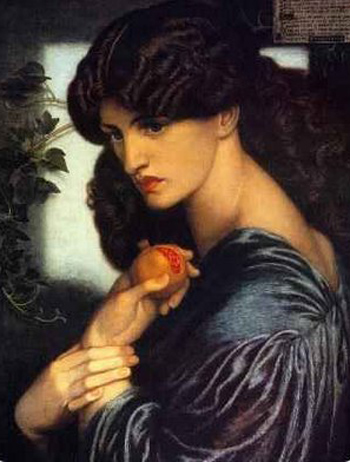
Proserpine

|
Proserpine - Historical Background
In 1874, Dante Gabriel Rossetti (1828-1882) created ‘Proserpine’, an oil painting inspired by an ancient Greek myth. The tale involves Demeter, the Greek goddess of harvest, and her daughter Persephone (or Proserpine) who was kidnapped by the god of the underworld, Hades. Hades tricked Persephone into eating six pomegranate seeds, each one representing a month of the year whereby she would be held captive as Hades' wife. During the remainder of the year, she would be allowed to return to her mother in the living world.
The figure in the painting is modeled after a woman named Jane Morris, who was married to Rossetti's friend William Morris. It is rumored that Jane was unhappy in her marriage and fell in love with Rossetti, which eventually led to a mutual, secretive love affair.
Analysis
Three versions of Proserpine exist in oil: the primary version dated 1877, the second dated 1874 and the third, circa 1882. The present work is the only recorded full-scale version. Amongst all of Rossetti’s paintings of Jane Morris, Proserpine most strongly conveys his fondness for her pre-Raphaelite look (the rich, black hair and long, graceful neck). As a young man, Rossetti was unable to decide whether to become a painter or a poet; hence, his art work tended to include poetic touches that defined his personal interpretation of literary sources. True to form, an Italian sonnet is perceived in the right hand corner of the Proserpine painting, possibly a love note dedicated to Jane Morris.
Proserpine is a magnificent piece of art that celebrates the elegance and beauty of the female form. Focus is on the woman adorned in a delicate, richly-hued gown, holding a pomegranate in her hand. The manner in which the woman holds her wrist with her other hand not only suggests a longing for human touch, but also implies submissiveness. The robe’s meticulous details give viewers a photorealistic sense of satiny smooth texture. The bluish-white light reflected from a nearby window highlights the woman's pale skin against her glossy black hair. The painting emits a mysterious aura, perhaps due to the lamp’s languid smoke trails. Proserpine’s facial expression is one of sadness, disappointment and resentment. Rossetti successfully captured stark, human emotion in this composition.
Proserpine is located in the Tate Gallery in London, UK












